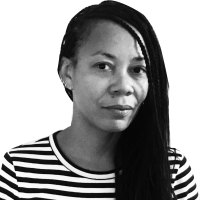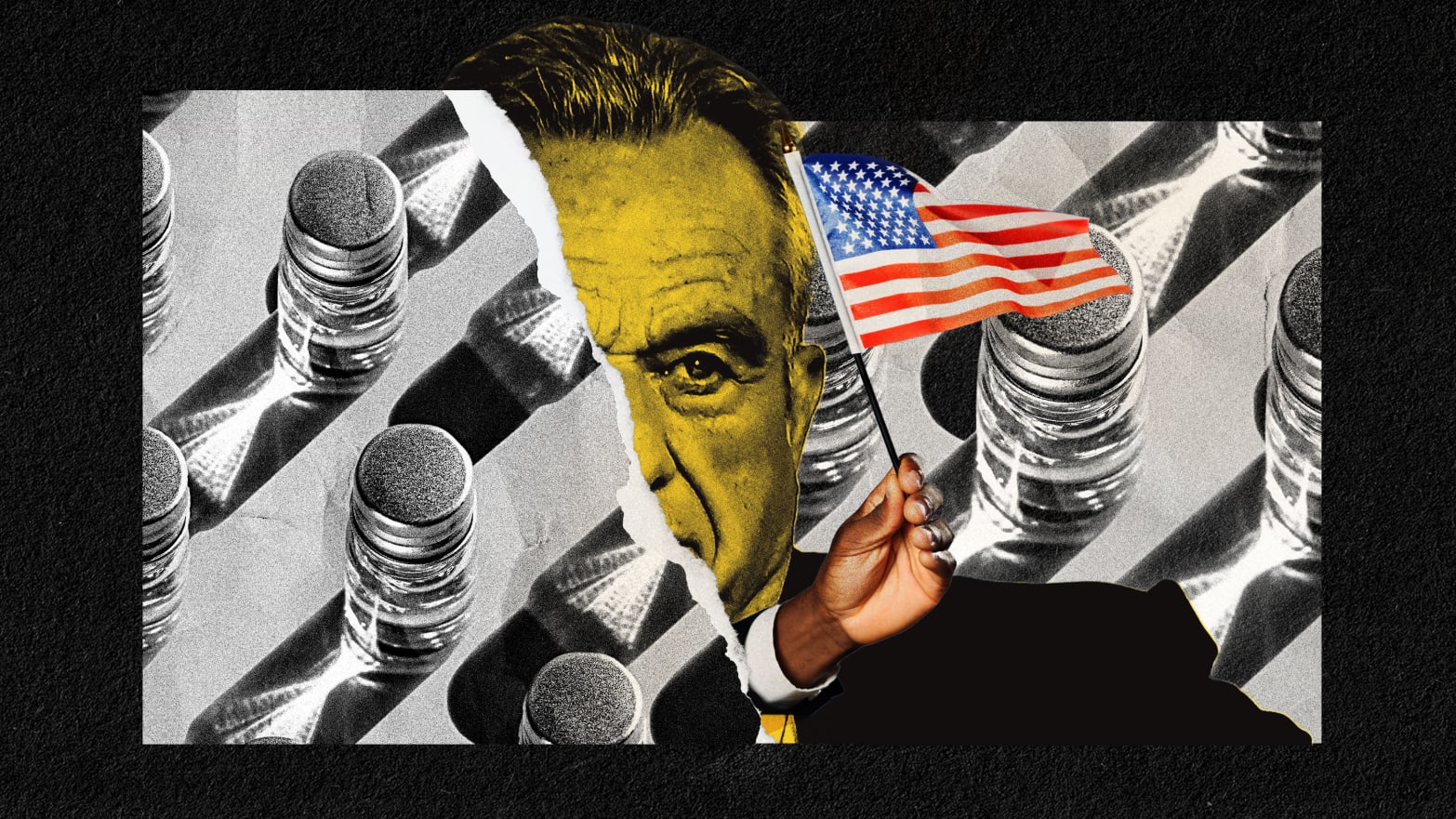Aside from being the scion of a famed American political dynasty, Democratic presidential contender Robert F. Kennedy Jr. is perhaps best known for what might generously be called a history of outspoken “vaccine skepticism.” (And more recently, I guess, also for being a “Do you even lift, bro?” type bro.)
To be clear, Kennedy has repeatedly insisted he’s “not anti-vaccine;” he’s in fact “pro-vaccine”—even “fiercely pro-vaccine.” It’s just that he’s also a “vaccine safety advocate,” which Kennedy apparently defines as a person who, lacking either medical or scientific credentials, spends two decades rejecting peer-reviewed scientific consensus in favor of his “own research,” from which he draws his own conclusions, which are then disseminated by his own multi-million dollar revenue-generating anti-vaccination nonprofit, Children’s Health Defense.
All too often, Kennedy—designated one of the Center for Countering Digital Hate’s “Disinformation Dozen,” to whom 65 percent of online vaccine pseudoscience is attributed—has made a concerted effort to spread his misinformation among Black people. Doing so has meant exploiting a mistrust of the American medical system engendered by a history of racist medical mistreatment and brutal experimentation.
PREACHING A GOSPEL OF LIES
The apex of Kennedy’s propagandizing to Black folks can be seen, literally, in the 2021 movie, Medical Racism: The New Apartheid.
The film rolled out just as the COVID-19 vaccine was becoming available, making it an opportune moment for Kennedy to spread yet more vaccine hesitancy among a population which, at least up until that point, was being disproportionately hit and hurt by the virus. Billing itself as a “documentary,” the movie includes a predominately Black roster of expert talking heads—doctors, historians, academics, public health advocates—and juxtaposes their interviews against accounts of inhumane abuses against Black folks committed by the American medical establishment.
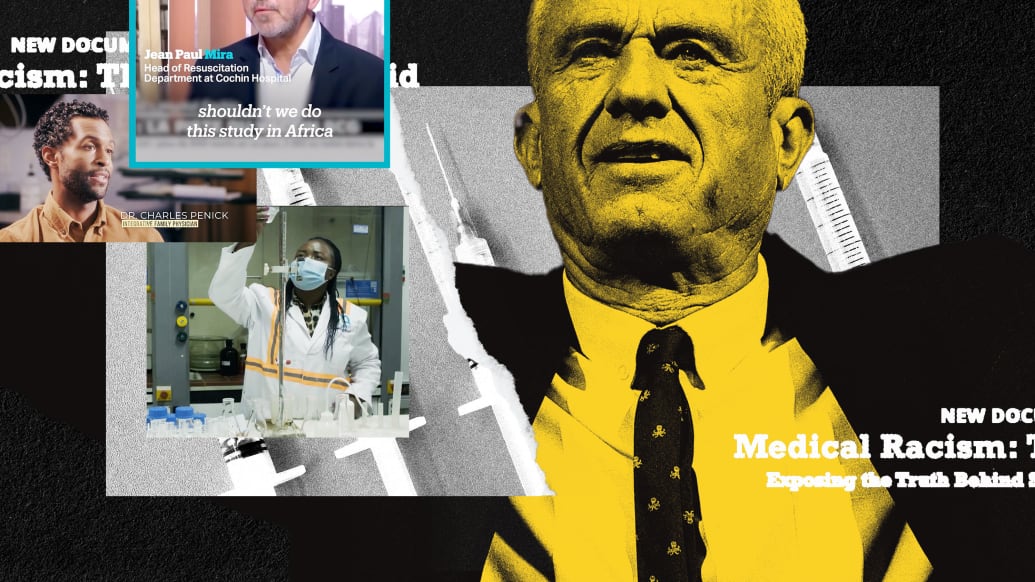
RFK’s “documentary” is full of debunked vaccine pseudoscience, conspiracy theories, deliberate omissions, and selective inclusions.
Photo Illustration by Luis G. Rendon/The Daily Beast/Getty/YouTube
The Tuskegee experiments, under which the U.S. government withheld syphilis treatment from Black men, the theft of Henrietta Lacks’ cells and legacy, the tortuous gynecological experiments on Black enslaved women by J. Marion Sims—each of these notorious injustices is touched upon, alongside quotidian modern-day examples of how doctors continue to neglect, ignore, and undertreat Black patients.
But there’s also plenty of debunked vaccine pseudoscience, conspiracy theories, deliberate omissions, and selective inclusions that muddy the informational waters.
In one instance, referencing a small-sample 2014 Mayo Clinic study that found Somali immigrants, Somali Americans, and other Black Americans (basically, folks of direct and diasporic African descent) had more vigorous antibody responses to the rubella vaccine than white study participants. After citing the study, physician Charles Penick, a noted vaccine skeptic, states that Black children “need probably about half the dose that kids are given,” lest they risk vaccine overdose.
James Neuenschwander, a Michigan doctor who has claimed the COVID-19 vaccine “doesn’t work,” subsequently appears onscreen to opine that because of their “kick ass kind of immune system,” vaccines put Black children at increased risk of autoimmune diseases, autism, and developmental delays, as well as illnesses including asthma, eczema, and ear infections.
The lead researcher on the Mayo study, Gregory Poland, has repeatedly refuted those extrapolations, telling FactCheck.org that the analysis was a“hypothesis generating” study, with too few sample subjects to yield any meaningful result. Poland says it needs to be repeated with a much larger pool of participants, but also that the film just gets the findings wrong in general.
“We do not have a study that shows African Americans need half the [rubella vaccine] dose. We do not have a study that shows African American children are being overdosed,” Poland told the website, calling the film’s assertions “like a good conspiracy theory—it contains a grain of truth with a lot of speculations around it.”
There are many more discrepancies in the movie—Vaxopedia actually takes the time to challenge them point-by-point—but the most obvious is that vaccines don’t cause autism, and the 1998 study by Andrew Wakefield initially positing the link has been not only refuted and retracted, but at least a dozen follow-up studies have conclusively established that no such link exists.
And yet, Kennedy’s film continues to circulate, even as some who appeared in it have denounced the project after seeing how their contributions were misapplied. (Stephen Karanja, a Kenyan OB/GYN, states in the film, “Africa has been protected by our interactions with the environment, and we are actually quite immune to some of these things. And I say this as a doctor, COVID does not belong to Africa. And therefore must not, there is no vaccine which should be tested in Africa.” Dr. Karanja died of COVID in April 2021.)
Yale historian Naomi Rogers told NPR that she had been misled about the movie’s message ahead of filming, and felt “used.” Oliver Waters, a prominent Black physician who testified before Congress in 2020 about racial disparities in COVID-19 morbidity, also later expressed regret over his appearance in the movie to the outlet. Waters had hoped to serve as a counter to the relentless misinformation dispensed by the film.
“The crux of the documentary is generally don’t get vaccinated,” the doctor told NPR after the film’s release. “There is an understandable concern in the African American community regarding vaccines. However, in the end, my position is you look past those, have an understanding of those and still get vaccinated… That nuance was not felt or presented in the documentary.”
Medical Racism represents the culmination of Kennedy’s efforts to make inroads among Black folks, which started years before he got into the movie business.
Harriet Washington is the author of Medical Apartheid, a lengthy book chronicling the many cruel and immoral medical atrocities (that we know of thus far) committed against Black people by white physicians and other medical practitioners between the mid-19th century and today. Washington told ABC News that Kennedy, a stranger to her, telephoned her out of the blue in 2014, claiming “African American boys were being used in secret vaccine experiments,” which he compared to the Tuskegee syphilis trials. When she questioned the veracity of his claims, Washington told ABC News, Kennedy “became very angry and began shouting at me," ultimately accusing her of “somehow being disloyal to African Americans.” (Kennedy has called Washington’s version of events “invented, crazy and just wrong.”)
In any case, there is a striking resemblance between the title of Washington’s oft-cited book and the aforementioned Kennedy documentary.
One year after his failure to “enlist” Washington, Kennedy forged forward, undeterred.
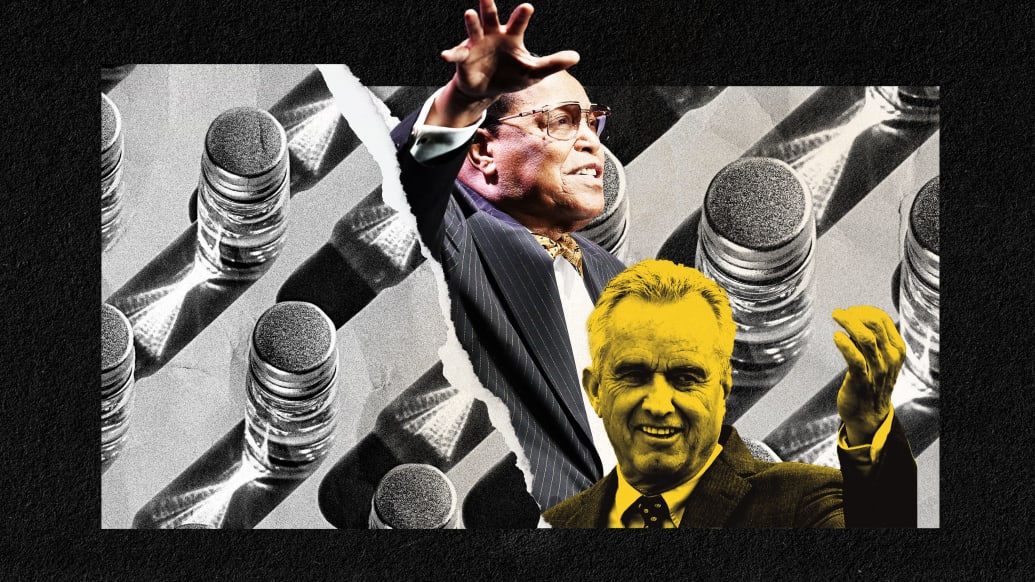
The Nation of Islam, under the leadership of Minister Louis Farrakhan, has teamed up with Robert F. Kennedy Jr. in anti-vaccine campaigns multiple times.
Photo Illustration by Luis G. Rendon/The Daily Beast/Getty/Reuters
He “requested a meeting” with Nation of Islam (NOI) head Minister Louis Farrakhan, according to the Wisconsin Medical Journal. In a June 2015 Breakfast Club interview, the NOI leader confirmed hosting Kennedy for dinner at his Chicago home, at which time Farrakhan says his guest informed him of a CDC-developed “vaccine that is genetically prepared, or concocted, to affect Black males,” and told him of “research” indicating scientists are “injecting [Black boys] with vaccines that are high in mercury. And this mercury starts eating at the cells of the brain.” (A Final Call article from a month later notes that “Mr. Kennedy had tried to sound the alarm throughout the Black community to no avail,” and quotes Minister Farrakhan as stating, “Some of us are afraid, but Mr. Kennedy found his way to our door.”)
Vaccine wariness was not new to the NOI. The Hon. Elijah Muhammad, who led the NOI for four decades until his death in 1975, prohibited “followers from taking the polio vaccine,” per the Final Call, and Farrakhan has previously suggested that U.S. and European vaccines distributed in Africa might be tainted with poison.
In any case, after forming a partnership, the NOI and Kennedy united forces (along with the Church of Scientology, but let’s not get too in the weeds here) in an ultimately losing battle against a California bill aimed at tightening vaccination rules for school children.
The next year, the NOI held a series of vaccine alarmist events in predominantly Black areas in “Compton, Atlanta, Chicago, and Minnesota.” These gatherings often included screenings of Vaxxed, a movie by disgraced researcher Andrew Wakefield—who, again, led the discredited 1998 study that kicked off all this anti-vaxx stuff—and various other key players in the vaccine denialism movement. Kennedy often appeared via Skype during post-film discussions.
Fast forward five years to the outbreak of the coronavirus pandemic, and it seems NOI and Kennedy continued their partnership. In fact, for the world debut of Medical Racism—which was co-produced by NOI’s Rev. Tony Muhammad—Kennedy chose a 2021 NOI conference in Chicago. In a speech at the event, Farrakhan praised the film and told the audience, “You need to follow Robert Kennedy.”
The National Action Network, led by Al Sharpton, announced a 2019 event featuring Kennedy to be held in New York City’s Harlem neighborhood. The forum was called off at the 11th hour—likely because of outrage expressed by Black public health officials familiar with Kennedy’s messaging.
CULTURE VULTURISM
Kennedy may have been early (among the predominantly white anti-vaxx field) to focus on proselytizing the gospel of vaccine denialism to Black folks—specifically by leaning into vaccine skepticism as a form of racial liberation activism—but his followers were quick to pick up the script.
It has sometimes taken the form of blatant culture vulturism, treating vaccine resistance as a new frontier for civil rights. A 2019 Newsweek article describes a scene in which “mostly white anti-vaccination protesters” opposed to a proposed California Senate bill on vaccinations “sang the Black civil rights anthem ‘We Shall Overcome,’ chanted ‘no segregation, no discrimination, yes on education for all’ and many wore shirts that read ‘Freedom Keepers.’”
Richard Allen Williams, founder of the Association of Black Cardiologists and former president of the National Medical Association, was unsparing in his criticisms of Kennedy during a 2021 AP interview, calling him “the ringleader of the misinformation campaign” and a “propaganda movement.” Williams also called out Kennedy’s Children’s Health Defense as “absolutely a racist operation.”
It’s hard to argue with that when you consider the devastating impact the organization has had.
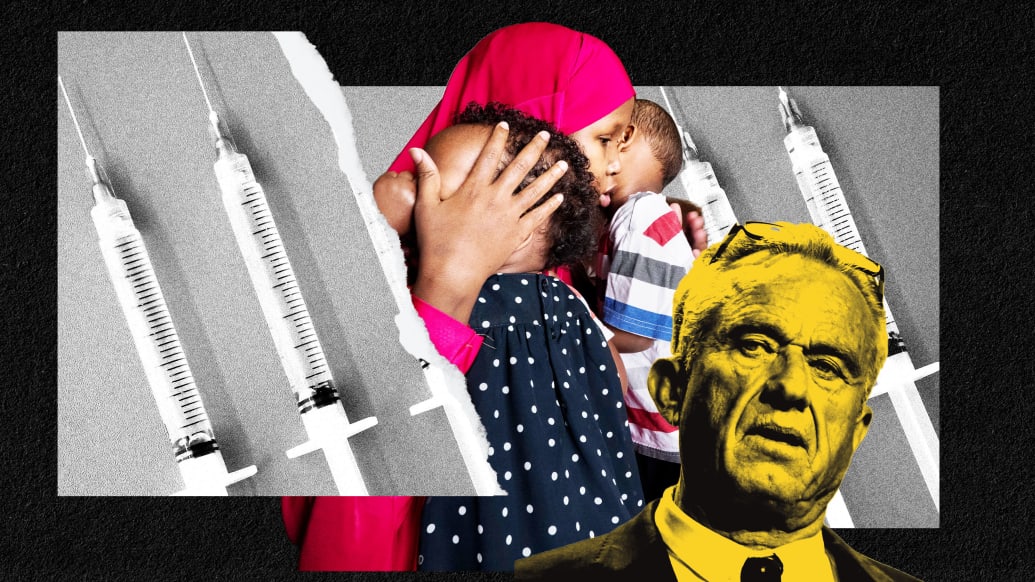
A Somali-American mother comforts her two children after they were diagnosed with measles during an outbreak in 2017. The mother refused the vaccine because of rumors that it caused autism.
Photo Illustration by Luis G. Rendon/The Daily Beast/Getty/Reuters
In May 2017, Minnesota experienced its largest measles outbreak in three decades, primarily affecting the state’s Somali community, which is the largest in the country. Just over a decade prior, vaccination rates for Somali children topped 90 percent, more than any other children in the state. But in 2008, Somali parents grew concerned over the growth of autism diagnoses among children in their community.
A 2013 University of Minnesota study indicated that Somali American children had autism rates on par with white kids in the state, but their cases seemed more severe.
Was the racial severity disparity related to racial bias, maybe? Somalis don’t even have a word for “autism,” so why were they seeing the emergence of the disease in the West? We don’t know, because there was little to no follow-up to investigate those questions. What we do know is that the space which should’ve been filled by proper medical inquiry was quickly occupied by anti-vaccination misinformation.
Wakefield, who visited the community multiple times, and others found a hyper-receptive crowd for their propaganda among concerned Somali parents, which helped fuel vaccine skepticism. By the time of the outbreak, MMR vaccine rates among young Somali-American children had plummeted to 42 percent. In the months after the outbreak, Kennedy wrote that while the press had pinned the crisis on “low vaccination rates,” they had overlooked the “story behind the story.”
“Both science and anecdotal evidence suggest that Africans and African Americans may be particularly vulnerable to vaccine injuries including autism,” Kennedy repeated. (But, again, he doesn’t know that.)
Let’s revisit the aforementioned 2014 study once more—the one Kennedy’s film cites as proof that Black immune systems are so hardy they may not even require vaccinations.
Head scientist Gregory Poland told Fact.org that there are myriad other possibilities than those posed by Kennedy’s film, including that vaccine doses might need to be increased for white kids, or that the increased antibody responses observed in Somali immigrant subjects might have resulted from being “exposed to rubella in refugee camps before arriving in the U.S., so the antibodies from the vaccine would have added to what was already in their systems.” In the end, only further trials can tell.
And that’s the thing. The half-baked theories offered by Kennedy aren’t rooted in science—they’re rooted in half-truths, incomplete data, and speculation. Kennedy repeats those conclusions—in films, speeches, and whenever he’s given the air to—with an unearned confidence that has actual consequences.
“We’ve known for a long time, there has been abundant evidence… beyond any dispute that Blacks are disproportionately harmed by vaccine injury,” Kennedy said in 2021 webinar, later adding, “Blacks react completely differently to vaccines… we now know it’s just one huge experiment on Black Americans, and they know what is happening and they are doing nothing.” In a 2020 interview, Kennedy asserted, “People with African blood react differently to vaccines than people with Caucasian blood. They’re much more sensitive.”
I don’t doubt that perhaps the fact that this study has never been repeated to shore up its findings might be the result of medical racism and indifference to Black well-being. Medical science and literature has traditionally overlooked or ignored Black folks, omitting them from studies when developing live-saving treatments—or worse, callously using them as guinea pigs without their consent or knowledge for the benefit of white lives. That’s no conspiracy thinking, that’s just the truth, one that every Black person is aware of.
But all that said, I’m no doctor, and so I can’t authoritatively say much about racial differences in vaccine response—except that we should keep looking into it. And Kennedy, who is also not a doctor, doesn’t have the answer either.
What I can say is that it’s irresponsible to pretend the science is settled. When you don’t know what you’re talking about, but you spout pseudoscience rooted in ideas of racial difference, it certainly starts to sound an awful lot like “race science.”
Historically, racial pseudoscience is precisely what was used to harm Black folks at every turn, and those ideas are still pervasive in medical realms.
Hearing so-called experts talk about how Black folks’ immune systems are so robust that they might not even need vaccines, I couldn’t help but recall studies showing white people think Black folks are “superhuman” and impervious to pain. That bias showed up in a University of Virginia study which found white medical school students believed—in 2016, no less—that Black folks’ “nerve endings are less sensitive than whites’; their blood coagulates more quickly than whites’; [and] their skin is thicker than whites.”
It’s this kind of thinking that explains why Black folks are routinely undertreated for pain, across socioeconomic levels.
The future of the medical establishment looks a lot like its past, frankly. And ironically, in his mission to connect today’s administration of vaccines to Black folks to the medical racism of the past, Kennedy fuels the same kind of racially specious thinking.
Last month, speaking with the Black Press of America, a coalition of African-American news outlets, Kennedy said that “Black Americans are going to be a principal priority” for his administration. He went on to emphasize the crisis in Black maternal mortality, said the health-care system is “predatory toward Black Americans,” and talked about the need for good treatment.
“If you’re Black in this country, you’re getting third-world style medical care,” Kennedy stated, noting that was true even when controlling for economics and other variables. “The medical system is not attuned to taking care of Black patients. Being a Black patient in this country is almost as dangerous as being a Black prisoner. You won’t get good medical care, which will be one of my priorities.”
When I reached out to Kennedy’s communications team with questions, they emailed this statement in response:
“Mr. Kennedy's position is that minorities, especially African Americans, have long been especially susceptible to exploitation for profit. Historically, they were also subjected to medical procedures without proper informed consent. Therefore, he believes that the corruption and lack of transparency in public health during the pandemic are of particular concern for these communities.”
That’s all real and it’s good to hear a candidate admit. But it should be stated that if Kennedy really wants to commit to Black health and well-being, he should start, at the very least, by sticking to the facts.
